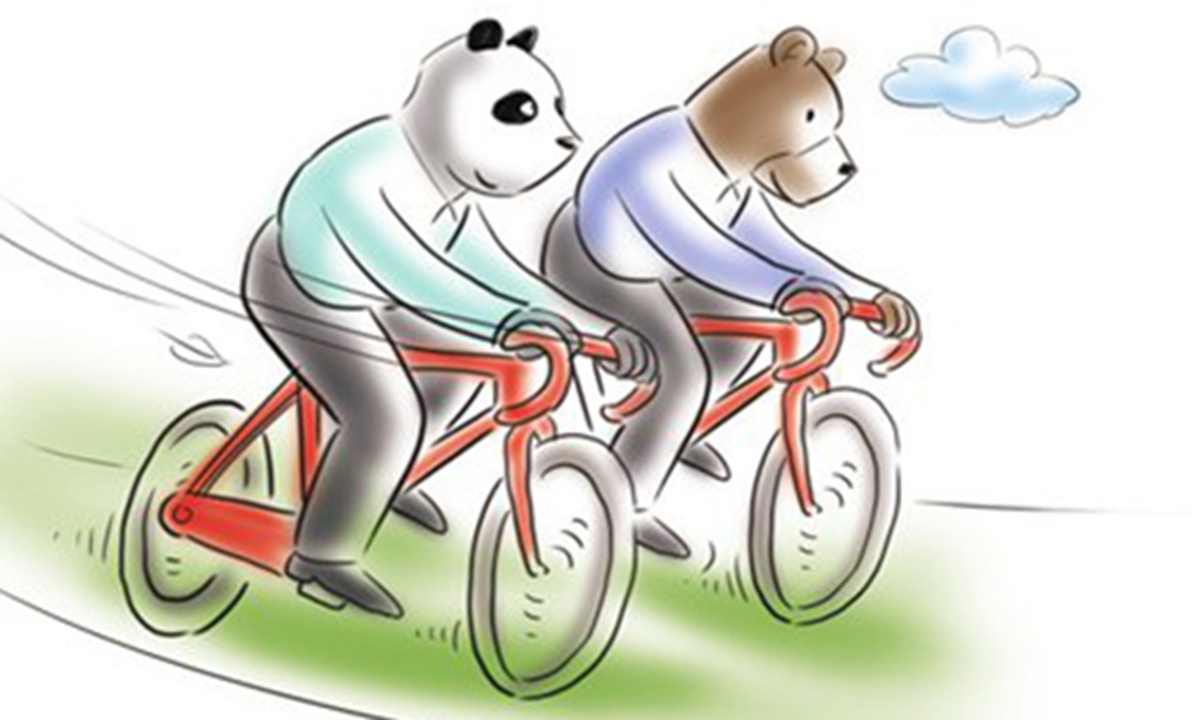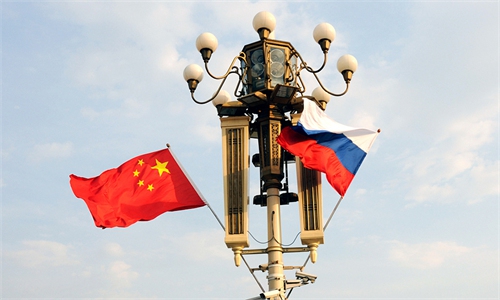
Illustration: Liu Rui/GT
Russian Foreign Minister Sergey Lavrov arrived in Guilin, South China's Guangxi Zhuang Autonomous Region, and met with Chinese State Councilor and Foreign Minister Wang Yi on Monday.Lavrov's visit is significant. First, this is the first high-level face-to-face meeting between China and Russia since the pandemic. Second, this year marks the 20th anniversary of the signing of the Treaty of Good Neighborliness and Friendly Cooperation Between China and Russia. Third, both China and Russia are witnessing escalating tensions with the US. The Alaska talks between top Chinese and US diplomats have just concluded. There is a greater urgency for China and Russia to strengthen their relations.
"China is a true strategic partner of Russia," Lavrov told the press as he embarked on the visit. To be honest, the title of "strategic partner" is depreciating in today's world. Even the term "ally" is depreciating. But China and Russia are worthy of the name of strategic partners.
The modern framework of building China-Russia strategic partnership started in the 1990s. The past 30 years have witnessed profound changes in the world's situation and power pattern. The relationship between China and Russia has gone deeper and deeper while overcoming all kinds of disturbances. Their strategic coordination has become stronger. It can be said that the relationship has withstood the challenge.
China-Russia comprehensive strategic partnership of coordination for a new era has become the most important diplomatic and strategic asset of China and Russia respectively and has supported the two countries to confront external challenges back-to-back. The two societies have felt the strategic benefits. The concept of "shared commitment to ever-lasting peace and win-win cooperation" between the two countries has been deeply rooted in the hearts of the people, and the areas of cooperation between the two countries have been expanding.
Despite the impact of the pandemic in 2020, China-Russia trade has exceeded $100 billion for the third consecutive year, and China remained Russia's largest trading partner for the 11th consecutive year. Russia exported 83.57 million tons of oil to China in 2020, remaining as China's top crude suppliers together with Saudi Arabia, which shipped 84.92 million tons to China. Their exports increased China's energy security.
China is also the largest export market for Russian agricultural products, which was not the case 10 years ago. China and Russia just signed a memorandum of understanding on joint construction of an international lunar research station. Scientific and technological cooperation has become a new focus.
China-Russia strategic partnership has formed an internal driving force, which, together with the strategic urgency caused by the international situation, has promoted the two countries' relations and formed a strong strategic stability. The two countries have explored a path of cooperation different from the previous experience.
First, China and Russia uphold a principle of non-alliance and they share a highly equal-footed strategic partnership. This is supportive for both countries, instead of dragging them behind. In contrast, Washington dominates all relations between the US and its allies, forcing its allies too often. The US also dragged some allies into wars from time to time, or led them to the disaster of terrorism.
Second, China and Russia, together with Central Asian countries, have jointly launched the Shanghai Cooperation Organization (SCO). Anti-terrorism and the need to deal with extremism were the initial driving force of the SCO, but its functions and scale have gradually expanded, corresponding to the region's actual needs. Russia has also been proactive in the cooperation of the China-proposed Belt and Road Initiative, not to mention the two countries coordinated actions in the UN. With growing international cooperation and their effectiveness, the two countries have become more confident in expanding their strategic coordination and the global significance of it.
Third, it is important that China-Russia cooperation has no upper limits. This will also make the forces attempting to attack China and Russia daunted. China and Russia do not intend to form a military alliance, if any country threatens or attacks either China or Russia militarily, it needs to consider the realistic risk of how the other country would react. Both China and Russia are strong power, their comprehensive strategic partnership of coordination for a new era has ruled out any possibility of any external forces militarily crushing either one of them.
The US and its major allies are sparing no effort in their ideological infiltration in China and Russia. Because of historical reasons, some people in both China and Russia remain skeptical that the two countries can maintain a strategic partnership in the long term. Some Chinese worry that once Russia's leadership changes, Russia may tilt toward the West and join the containment against China.
Although there is no eternal state in international relations, the strategic partnership of coordination between Beijing and Moscow that has been formed over the past three decades is by no means temporary and fragile. The two countries have resolved all territorial issues, which provide the basic conditions for long-term good neighborliness and friendship. Russia has never been truly accepted by the West. The country is too big for the West to handle, and it no longer holds the illusion of integrating into the West. Russia's national interests require a multi-polar world where Russia itself is one pole. This fits China's aspirations fundamentally, yet it diverges essentially from what the US believes in.
Regardless of history, Beijing and Moscow have become strategic partners that cannot be separated from each other. The two countries not only maintain and develop their relations back-to-back, but also meet challenges shoulder-to-shoulder. There are countless forces consolidating this situation. This is the inevitable choice of the two countries and their peoples in the 21st century, and it is what the world expects from these two great powers.

